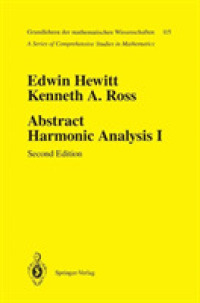- ホーム
- > 洋書
- > 英文書
- > Politics / International Relations
Full Description
Amid a global health crisis, the process for declaring a Public Health Emergency of International Concern (PHEIC) is at a crossroads.
As a formal declaration by the World Health Organization, a PHEIC is governed by clear legislation as to what is, and what is not, deemed a global health security threat. However, it has become increasingly politicized, and the legal criteria now appear to be secondary to the political motivation or outcome of the announcement. Addressing multiple empirical case studies, including COVID-19, this multidisciplinary book explores the relationship between international law and international relations to interrogate how a PHEIC is declared and its role in how we collectively respond to outbreaks.
Contents
Introduction
1. From Westphaliam to Post-Westphalian? The Origins of the PHEIC Declaration and the 2005 International Health Regulations
2. A Public Health Emergency of International Concern: Between Legal Obligations and Political Reality
3. Case Studies on the PHEIC Declaration
4. Events That Were Not Declared a PHEIC
Conclusion





